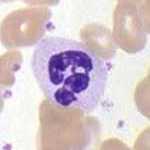Neutropenia
Editor-In-Chief: Prab R Tumpati, MD
Obesity, Sleep & Internal medicine
Founder, WikiMD Wellnesspedia &
W8MD medical weight loss NYC and sleep center NYC
| Neutropenia | |
|---|---|
| Synonyms | Agranulocytosis, granulocytopenia |
| Pronounce | N/A |
| Specialty | N/A |
| Symptoms | Fever, infections, mouth ulcers, sore throat |
| Complications | Sepsis, pneumonia, abscess |
| Onset | Any age |
| Duration | Varies |
| Types | N/A |
| Causes | Chemotherapy, autoimmune disorders, bone marrow disorders, infections |
| Risks | Cancer treatment, HIV/AIDS, autoimmune diseases |
| Diagnosis | Complete blood count, bone marrow biopsy |
| Differential diagnosis | Leukopenia, anemia, thrombocytopenia |
| Prevention | N/A |
| Treatment | Granulocyte colony-stimulating factor, antibiotics, immunosuppressive therapy |
| Medication | N/A |
| Prognosis | Varies depending on cause |
| Frequency | Common in patients undergoing chemotherapy |
| Deaths | N/A |
Neutropenia is a hematologic disorder characterized by an abnormally low concentration of neutrophils, a type of white blood cell, in the bloodstream. As neutrophils play a pivotal role in the body's defense mechanism against bacterial and fungal infections, individuals with neutropenia are at an increased risk of infections.
Etiology[edit | edit source]
Neutropenia can result from a multitude of factors:
- Bone marrow disorders: Conditions like leukemia, myelofibrosis, or vitamin B12 and folic acid deficiencies can cause neutropenia.
- Chemotherapy and Radiation: These cancer treatments can temporarily reduce the number of neutrophils.
- Certain Medications: Drugs, including antipsychotics and certain antibiotics, can result in drug-induced neutropenia.
- Autoimmune disorders: Conditions like lupus or rheumatoid arthritis can target and destroy neutrophils.
- Infections: Some diseases, such as tuberculosis or HIV/AIDS, can lead to neutropenia.
Classification[edit | edit source]
Neutropenia is typically categorized based on its severity:
- Mild Neutropenia: Neutrophil count of 1,000 to 1,500/mcL.
- Moderate Neutropenia: Neutrophil count of 500 to 1,000/mcL.
- Severe Neutropenia: Neutrophil count of less than 500/mcL.
The duration of neutropenia can also vary, from acute (short term) to chronic (lasting several months to years).
Symptoms[edit | edit source]
While neutropenia itself might be asymptomatic, the reduction in the neutrophil count compromises the immune system, leading to:
- Increased susceptibility to infections.
- Prolonged fever.
- Ulcers in the mouth.
- Gum and dental issues.
- General fatigue.
Diagnosis[edit | edit source]
Neutropenia is typically diagnosed via a complete blood count (CBC), which measures the number of white and red blood cells in the bloodstream. If neutropenia is detected, further tests may be ordered to ascertain its root cause.
Management[edit | edit source]
Treatment modalities are contingent on the cause, severity, and associated complications of neutropenia:
- Granulocyte colony-stimulating factor (G-CSF): Medications like filgrastim stimulate bone marrow to produce more neutrophils.
- Antibiotics or antifungals: Given either as a preventive measure or to treat active infections.
- Bone Marrow Transplant: In cases where the bone marrow is not producing neutrophils efficiently.
- Lifestyle Measures: Patients may be advised to follow hygiene practices, avoid crowded places, and abstain from certain foods to reduce infection risk.
Summary[edit | edit source]
Neutropenia is a significant condition that can drastically compromise an individual's immune system. Prompt diagnosis and targeted treatment are essential to prevent associated complications, especially infections.
See Also[edit | edit source]
- White Blood Cells
- Bone Marrow Disorders
- Chemotherapy
- Granulocyte colony-stimulating factor
- Complete Blood Count
| This article is a medical stub. You can help WikiMD by expanding it! | |
|---|---|
| Myeloid blood cells and plasma | ||||||
|---|---|---|---|---|---|---|
|
| Hematologic disease: Monocyte and granulocyte disease (CFU-GM/CFU-Baso/CFU-Eos), including immunodeficiency (D70-D71, 288) | ||||||||||||
|---|---|---|---|---|---|---|---|---|---|---|---|---|
|
Search WikiMD
Ad.Tired of being Overweight? Try W8MD's physician weight loss program.
Semaglutide (Ozempic / Wegovy and Tirzepatide (Mounjaro / Zepbound) available.
Advertise on WikiMD
|
WikiMD's Wellness Encyclopedia |
| Let Food Be Thy Medicine Medicine Thy Food - Hippocrates |
Translate this page: - East Asian
中文,
日本,
한국어,
South Asian
हिन्दी,
தமிழ்,
తెలుగు,
Urdu,
ಕನ್ನಡ,
Southeast Asian
Indonesian,
Vietnamese,
Thai,
မြန်မာဘာသာ,
বাংলা
European
español,
Deutsch,
français,
Greek,
português do Brasil,
polski,
română,
русский,
Nederlands,
norsk,
svenska,
suomi,
Italian
Middle Eastern & African
عربى,
Turkish,
Persian,
Hebrew,
Afrikaans,
isiZulu,
Kiswahili,
Other
Bulgarian,
Hungarian,
Czech,
Swedish,
മലയാളം,
मराठी,
ਪੰਜਾਬੀ,
ગુજરાતી,
Portuguese,
Ukrainian
Medical Disclaimer: WikiMD is not a substitute for professional medical advice. The information on WikiMD is provided as an information resource only, may be incorrect, outdated or misleading, and is not to be used or relied on for any diagnostic or treatment purposes. Please consult your health care provider before making any healthcare decisions or for guidance about a specific medical condition. WikiMD expressly disclaims responsibility, and shall have no liability, for any damages, loss, injury, or liability whatsoever suffered as a result of your reliance on the information contained in this site. By visiting this site you agree to the foregoing terms and conditions, which may from time to time be changed or supplemented by WikiMD. If you do not agree to the foregoing terms and conditions, you should not enter or use this site. See full disclaimer.
Credits:Most images are courtesy of Wikimedia commons, and templates, categories Wikipedia, licensed under CC BY SA or similar.
Contributors: Prab R. Tumpati, MD



